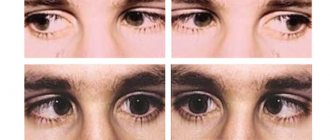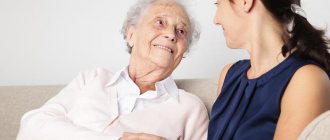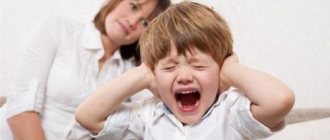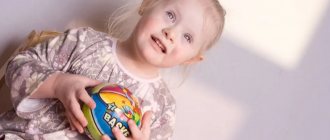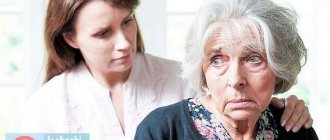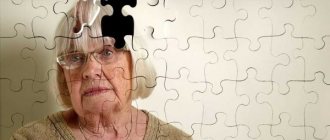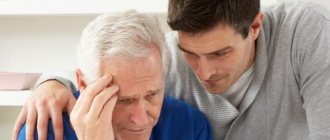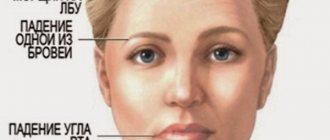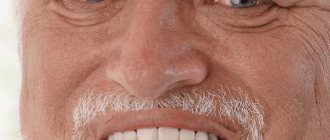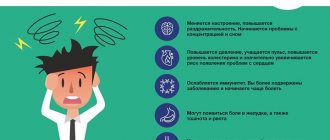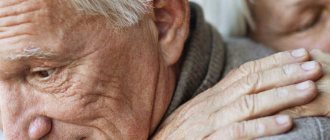Dementia is acquired dementia, a persistent decline in cognitive activity with the loss of previously acquired knowledge, practical skills and the inability to learn new things. Due to the death of brain cells, a person cannot perform the simplest tasks.
Main reasons for development:
- Alzheimer's disease (defined as dementia of the Alzheimer's type);
- severe vascular damage affecting the brain (vascular dementia).
Other reasons:
- neoplasms in the brain;
- traumatic brain injury;
- diseases of the nervous system.
How can you tell if a person has dementia?
Making a diagnosis is the doctor’s task. But you may suspect your loved one is developing dementia if you notice that he or she:
- often loses important things and puts them in strange places;
- often asks again, forgetting the answer just received;
- confuses time or gets lost in a familiar place;
- has difficulty concentrating, makes mistakes in financial calculations;
- cannot learn simple instructions, such as how to turn on a washing machine or microwave oven.
There are other signs of dementia: for example, if a person suddenly has a sharp change in character, behavior, if his mood begins to change frequently for no reason. Already in the early stages, an active person can suddenly become apathetic, lack initiative, and stop enjoying any activity. Later, as dementia progresses, some patients become irritable, impatient or impulsive, while others become restless and even aggressive. The person may experience delusional thoughts (for example, that neighbors are watching him or stealing his things) and sexual disinhibition. Disruption of brain function leads to the fact that behavior ceases to be conscious, the patient does not recognize his relatives, and gradually loses the ability to understand speech and speak.
Factors contributing to the development of senile dementia
It cannot be said unequivocally that there are specific factors that provoke this disease.
Since under similar circumstances, in some people the disease actively develops, while in others the ability to think clearly remains for the rest of their lives.
But there are still conditions that increase the risk of the onset and development of senile dementia.
Here are some of them:
- systematic high or low blood pressure;
- brain tumors;
- suffered strokes and heart attacks;
- genetic predisposition;
- Alzheimer's disease;
- diabetes;
- bad habits.
Taking into account the causes of the development of this disease, experts come to the conclusion that they are associated with disruption of blood flow in the blood vessels of the brain and the inability to create synapses between neurons.
Dementia in older people
Translated from Latin, the word means “dementia.” The main reason is organic damage to the brain, leading to dysfunction of higher nervous activity. The patient's mental abilities decrease, he cannot perform basic calculations, practical skills and knowledge are lost, and it becomes impossible to acquire new ones.
Our clinic specialists are guided by a complete medical history in the treatment of dementia. The clinical picture depends on the location of the brain lesion, its extent, the prerequisites for the development of the disease, age and general health.
The danger lies in the persistence of the disorder; it only progresses over time. Initially, the defeat affects intellectual activity, then disturbances in the emotional-volitional sphere become noticeable. The final stage is the complete and irreversible disintegration of personality.
Degree of development of dementia
Depending on the social adaptation of the individual, three degrees of the disease are distinguished:
- Mild senile dementia. It is characterized by the fact that professional skills are degraded, social activity is reduced, and the craving for activities that were previously interesting has weakened or disappeared completely. Despite this, a person orients himself in space and is able to ensure his life activities.
- Moderate or mild dementia . At this level, the patient must be closely monitored. He will not be able to use household appliances. He may not even be able to open the door with the key himself. In common parlance, this degree of severity is called “senile insanity.” Patients take care of personal hygiene, but need help in everyday life.
- Severe degree . There is complete disadaptation and personality degradation. If the disease has developed to this stage, then the patient needs constant care; he cannot take care of himself: neither get dressed, nor eat, nor wash, etc.
Sedatives and sleeping pills
Senile dementia often leads to insomnia, anxious moods, hypochondria, unexpected aggression, even delirium and visions. Such symptoms should be treated to improve the patient's condition. Depression and poor sleep worsen the progression of dementia.
Combines the properties of a neuroleptic, antidepressant and tranquilizer. This unique medication also works as a sleeping pill, sedative, and anti-manic. Sonapax removes phobias, anxieties, and hostile tension.
Sonapax is used for depression and dementia of various types: vascular, Alzheimer's, combined. The medication relieves motor agitation and treats sleep disturbances. A calm patient is easier to care for.
Prices for Sonapax tablets 10 mg 60 pcs.
Prices for Sonapax tablets 25 mg 60 pcs.
Prices for Sonapax tablets 25 mg 60 pcs.
Phenazepam
It is not recommended to use for insomnia. Perhaps only once, in an acute condition. The progression of dementia with a course of taking Phenazepam intensifies, and the patient’s well-being worsens.
Prices for Phenazepam tablets 0.5 mg 50 pcs.
Prices for Phenazepam tablets 1 mg 50 pcs.
Prices for Phenazepam tablets 2.5 mg 50 pcs.
Watch out for the first signs of dementia
If you pay attention to the first symptoms of a developing disease in time, you can immediately take action and slow down its progression, or even stop it altogether at a mild stage. The main symptoms include:
- the appearance of absent-mindedness, memory disorders;
- problems with speech arise, the patient’s vocabulary becomes significantly poorer, and thinking is impaired;
- in the behavior of an elderly person, deviations from the norm are formed, negative character traits are aggravated, egocentrism appears, manifestations of aggression, or suspicion, increased anxiety are possible;
- An elderly person is poorly oriented in time, may confuse important dates and events, and depending on the area of brain damage, the senses of perception of the surrounding world suffer.
Treatment of dementia or how to treat a patient
First of all, family members of the patient should understand that this disease is practically incurable. Doctors can only slow down the process of brain dying, but it is impossible to stop the destruction or restore the affected areas. As already noted, the patient will require constant care, including hygienic and medical procedures.
- Those around you will need great patience and understanding of the situation, because changes in the patient’s behavior have nothing to do with his character or hatred of others, but are a consequence of pathological disorders.
- Treatment in a hospital setting will undoubtedly provide optimal medical control, but staying in the hospital for a long time can affect the psychological state of an older person.
- If possible, the best option would be to keep the patient at home with the assistance of a qualified caregiver. At the same time, you will be able to control the treatment process, as well as create the most comfortable environment for your loved one, a familiar way of life, home-cooked meals and communication with family.
In a state of psychological rest, most older people have a positive mood, an improvement in mental activity and the restoration of an adequate perception of reality.
A person with dementia requires constant care
At an early stage of the disease, attention should be paid to the following principles of auxiliary therapy:
- Maintaining peace of mind. Avoid nervous and emotional stress of the patient. To do this, it is necessary to create a calm home atmosphere with a constant circle of communication. For the patient, there must be a certain daily routine with mandatory periods of silence and rest. It is also important to ensure a good night's sleep. This will help get rid of anxiety and psychological stress.
- Physical activity. It is necessary to devote time to the patient’s physical activity - daily walks, feasible homework, physical therapy, swimming. Such exercises will help increase blood circulation and oxygen saturation of tissues. In addition, they have a beneficial effect on the patient’s mood.
- Nutrition control. The patient's diet should contain foods that help lower cholesterol - legumes, vegetable oils, nuts (almonds, cashews, pistachios, pine), citrus fruits, carrots, sweet peppers, eggplants. Fermented milk products, lean meats and fish, seafood, and herbs are healthy. It is better to steam all dishes with a minimum content of salt and sugar.
Drug treatment
Drugs for dementia are the main branch of therapy, thanks to which the pathological process slows down.
Memory, attention, thinking
These three mental processes are primarily affected in dementia of the Alzheimer's type, Pick's disease (frontotemporal dementia), and if dementia with Lewy bodies develops.
The following drugs are used to treat processes:
- Rivastigmine. It inhibits the formation of acetylcholinesterase and butyrylcholinesterase. The drug has the greatest “adhesion” with the hippocampus and parahippocampal region - these are the places that are responsible for the memory process.
- Donepezil. This is a highly specific drug for cholinesterase. It has few side effects and interacts well with diuretics.
- Galantamine. The drug enhances the effect of the mediator acetylcholine due to its effect on nicotinic receptors.
- Ipidacrine. Inhibits the production of acetylcholinesterase. As a result of the effect of the drug, the excitation time of neurons increases.
- Memantine. This is the standard of care. The drug belongs to the group of NMDA antagonists. The drug is included in the group of vital and essential drugs. The pharmacological actions of Memantine are that it improves the relationship and conductivity between areas of the cerebral cortex, and between the cortex and subcortical structures. The gold standard stabilizes the patient’s cognitive properties and normalizes behavior.
Ancillary drugs
At all stages of the disease, the main treatment is necessarily supplemented with auxiliary means - not only medications, but also vitamins and dietary supplements. The choice of certain drugs is determined by the nature of the pathological processes.
Neuroleptics
Neuroleptic drugs relieve psychosis and excessive excitability. Stimulant-type antipsychotics, on the contrary, eliminate apathy and lethargy
Such drugs are chosen very carefully for senile dementia, since they cause many side effects in older people. Depending on the manifestations of the pathology, the most commonly used antipsychotics are:
- Chlorprothixene
- Sonapax
- Tizercin
- Eglonil
- Haloperidol.
If a patient with dementia exhibits aggressive behavior and excessive excitability, he is prescribed anti-aggression medications of the Benzodiazepine class. All these medications are available only with a doctor's prescription. The main side effects are lethargy and drowsiness.
Nootropics
Nootropic pills help maintain clarity of thinking, increase concentration and improve memory. For dementia, the following are usually prescribed:
Side effects may include agitation, anxiety, and allergic reactions.
Antidepressants
For depression and depressed mood, the following antidepressants are prescribed to dementia patients:
The first drug for dementia in older people is prescribed with caution due to many side effects, including psychosis, cardiac dysfunction, decreased visual acuity, and clouding of consciousness. The second medicine has virtually no side effects
Vascular drugs, antioxidants
Vascular medications are necessarily included in the course of treatment for vascular dementia to prevent thrombosis, stroke and other consequences of vascular pathologies. In these cases, the following are traditionally prescribed:
In addition, antioxidants and antihypoxants, such as Actovegin, Mexidol, and Gingko biloba, are used to improve the condition of cerebral vessels.
Sedatives and hypnotics
Acquired dementia, especially senile dementia, often causes deterioration in the quality of night's rest and various phobias. Therefore, the number of medications for dementia for older people must include sedatives and hypnotics.
In the mild stage, herbal preparations are used, and in the moderate stage, stronger agents are required, such as:
They are taken carefully so as not to get the opposite effect, expressed by inappropriate behavior with hallucinations. All of the conditions described above can be observed in loved ones who care for a dementia patient
In such cases, they are also advised to use medications as prescribed by a doctor based on the diagnosed disorder.
All of the conditions described above can be observed in loved ones who care for a dementia patient. In such cases, they are also advised to use medications as prescribed by a doctor based on the diagnosed disorder.
Vitamins, dietary supplements
For complex treatment of pathology in the early stages, it is recommended to take vitamins and other biologically active supplements. The most useful vitamins for dementia patients are vitamins B, C and E, as well as fish oil and lecithin.
Such additives produce a number of important actions:
- slow down aging;
- strengthen nerve fibers;
- increase stress resistance;
- have a pronounced antioxidant and immunomodulatory effect;
- prevent the development of strokes.
In patients with senile insanity, taking these supplements improves brain function and stabilizes the nervous system without the slightest side effects.
Acupuncture
Acupuncture is an ancient method of preventing many diseases, which consists of acupuncture.
It is performed by professionals who know where the necessary active points on the human body are. The impact of thin needles on certain nerve centers helps patients keep their body in a certain tone. Considering that patients with dementia have a fairly sedentary lifestyle, any stimulation of the body will be beneficial.
Non-drug treatment
In addition to taking medications, patients with dementia are prescribed:
- cognitive training - involves joint reading, reproduction and discussion of what has been read, memorization of lines and quatrains, classes with special cards, etc., since everything learned will soon be forgotten by the patient - regular daily exercises are important;
- biographical training - based on maintaining memories of the past that are erased from memory. This is facilitated by discussing events of the past, looking at old photos, listening to retro music, etc.;
- Keeping a diary allows you not only to train your thinking ability and record current events, but also helps to throw out accumulated emotions and get rid of negative experiences;
- physical activity - includes performing a set of special exercises and simply walking in the fresh air;
- art therapy, music therapy, pet therapy - perform educational, developmental, therapeutic tasks.
Non-drug treatment involves daily work with the patient.
Dementia: causes, symptoms, treatment, prevention
Specialists at the boarding house for the elderly “Dacha” Kolomyazhsky told us that it all starts with slight forgetfulness, but gradually the elderly person begins to show the first signs:
- Tremor develops and fine motor skills deteriorate;
- Poor hygiene. A person may not put on mandatory clothing, forget to take a shower, or brush his teeth;
- Speech and thought disorders;
- Deterioration of psychomotor skills.
The most dangerous thing at the beginning of the disease is forgetfulness. Forgetting important data, an elderly person can, for example, get lost. Over time, spatiotemporal disorientation develops, when a person is generally unable to understand and explain his location.
Fixation amnesia may occur. The patient is not able to remember what happened to him yesterday, but he can tell in detail about the events that happened to him many years ago. Gradually the memories fade away. Paramnesia – false memories – may also appear. The patient tells stories about himself that did not happen in his life.
You can recognize the onset of dementia by the signs described above, which only arise and partially manifest themselves. As the disease progresses, these signs worsen and become the primary symptoms, to which new ones are added.
The symptoms of dementia will depend on the damage to the brain. Experts share the symptoms of vascular and atrophic dementia.
Vascular dementias include:
- Senile;
- Dementia due to atherosclerosis;
- After ischemic and hemorrhagic stroke.
At the onset of the disease, the first signs appear within 3 months:
- Absent-mindedness, poor concentration;
- Deterioration of memory for events of the present period;
- Decreased interest in current events;
- Deterioration in mental abilities, social engagement and initiative;
- Increased anxiety and irritability;
- Drowsiness during the day and evening, insomnia at night.
Several of the following symptoms are observed:
- Memory is impaired. A person forgets about dates, names, current events, but remembers his youth well. Amnesia then develops.
- Personality changes. The development of negative qualities and those that previously did not appear so often. For example, it could be tearfulness, grumpiness, capriciousness, greed.
- Lack of hygiene. The patient stops taking care of cleanliness and becomes indifferent to his appearance. Urinary incontinence may occur.
- Cognitive problems. People experience severe memory loss, disorientation, difficulty understanding spoken and written language, and difficulty with goal-directed actions and planning.
- Movement disorders: unsteady gait, frequent falls. Muscle work is impaired, the voice becomes less sonorous, it is difficult to speak and swallow. Paralysis and paresis occur.
This type includes Pick's disease, Parkinson's disease, Alzheimer's disease, and Huntington's chorea. Brain cells shrink in size, stop functioning and die. Neural connections that underlie brain functions are disrupted.
Dementia begins unnoticed and develops over 5-8 years.
The signs are as follows:
- Memory deteriorates. It is difficult to remember new information, then he has difficulty remembering the meaning of words, skills and individual life moments. In severe cases, a person with dementia does not recognize relatives.
- Thinking disorder. The patient cannot analyze sensibly, engage in mental work and plan. Delirium ensues. Orientation in time and terrain deteriorates.
- Perception decreases: vision, hearing, tactile sensations. The patient does not recognize people and objects.
- Emotional problems and disorders: apathy, depression, etc.
- Loss of self-care ability. A person cannot dress and undress himself, maintain hygiene and eat.
- Communication disorders: a person forgets words, chooses inappropriate ones, and loses reading and writing skills.
- Increased muscle tone, slower movements, hunching.
- Epilepsy attacks.
- Personal changes. Aggression and foul language may develop. Opposite qualities develop.
At the moderate and deep stages, people may develop mental disorders: depression, delusions, hallucinations, motor and mental agitation, and drive disorders.
Prevention
As you know, the most promising direction in the fight against dementia throughout the world today is prevention, and not the search for a cure for Alzheimer’s disease.
- Physical activity. It is difficult to find another method that would have the same complex effect. Therefore, modern doctors primarily recommend not memorizing poetry or solving crossword puzzles, but physical activity that is appropriate for the patient’s age.
- Diet. In second place, apparently, we should put diet - it both protects from damage and can prevent the development of inflammatory processes. The model diet for the brain is usually the Mediterranean-type diet (little meat, lots of fish, vegetables and fruits).
- Social activity and depression control. Both of these areas increase the cognitive reserves of the brain and prevent its damage.
- Intellectual work. Solving non-trivial problems, mastering new types of activities. Weight control and other forms of prevention/treatment of hypertension, diabetes, high levels of “bad” cholesterol.
- To give up smoking. This is indeed a very important factor.
Drugs for severe dementia
In the final degree of dementia, a person experiences total degradation of personality. The person stops recognizing relatives, does not eat on his own, and does not wash himself. The patient sees delusional visions and may be rude out of fear that he is being attacked.
In such cases, doctors prescribe Halopiredol and new generation drugs of similar action: Olanzapine; Risperidone. All other drugs remain the same as in the early stages, antidepressants, sedatives and memory improvers.
Risperidone
It is prescribed when a person exhibits psychosis, delusions and hallucinations. The medication also reduces irritability and aggression.
Taking it reduces the patient's hostility, suspicion, anxiety, guilt, depression, and detachment. Adequate thinking returns, speech and social communication are normalized. The drug is contraindicated in Parkinson's disease and epilepsy. Indicated for dementia of the schizophrenic type.
Prices for Risperidone tablets 2 mg 20 pcs.
Prices for Risperidone tablets 4 mg 20 pcs.
Olanzapine
Prescribed today instead of Galopiredol. In addition to being effective against hallucinations, it relieves depression, anxiety, tension and other mental disorders. Indicated for dementia of the schizophrenic type.
According to the study, Olanzapine is superior to Halopiredol in improving cognitive functions and restoring mental disorders. Relapses during treatment with Olanzapine occur much less frequently.
Indicated for speech disorders, decreased social activity, acute manic attacks, schizophrenia, and dementia.
The medicine increases the risk of developing diabetes, hypertension, weight gain, cancer, cholelithiasis, myocardial infarction, and stroke. Therefore, it is contraindicated for people prone to these pathologies.
Prices for Olanzapine tablets 10 mg 28 pcs.
Prices for Olanzapine tablets 5 mg 28 pcs.
How to treat with folk remedies
Is it possible to cure dementia with folk remedies? Traditional medicine is used in complex treatment. As monotherapy, this method does not bring tangible results.
The following herbs are used to improve memory and attention:
- Eleutherococcus;
- lemongrass;
- ginseng.
The following recipes have also worked well:
- A decoction of rowan bark. 50 grams of raw materials are poured into 200 ml of boiling water and boiled for 5 minutes. After cooling down, drink 50 ml 5 times a day.
- A decoction of a mixture of valerian rhizomes and fennel fruits. The product reduces excitability and improves sleep. You can drink this decoction twice a day, 200 ml.
- Tea made from ginkgo biloba leaves improves memory and prevents the destruction of brain cells.
- Blueberry juice reduces atherosclerotic plaques and improves memory. Every day you need to drink 250 ml of juice.
Patients with dementia are prescribed vitamins:
- Omega 3 . Improve memory and other cognitive functions in vascular dementia. This supplement must be taken continuously.
- Vitamin E. The properties of the vitamin have been proven to reduce the symptoms of dementia, however, this remedy is contraindicated in heart pathologies.
- Coenzyme Q10 is an antioxidant that improves heart and brain function.
Alternative medicine
Alternative treatments for dementia include those treatments that help reduce patients' anxiety levels and help them relax. Among such means, some experts suggest using music therapy, in which listening to music helps to calm down and put a person’s thoughts in order, therapy based on communication with beloved animals, which relaxes, gives positive emotions, puts you in a positive mood, aromatherapy using special essential oils , massage and art therapy, during which a person can create his own work of art.
All of the above alternative treatment methods are good because they have no contraindications (except for aromatherapy, which can sometimes cause allergic reactions).
Neuroleptics and vascular drugs
Neuroleptics include: Aminazine, Tizercin, Melleril, Etaperazine, Moditene and others. We’ll write more about some of them.
Propazine
Eliminates depressive effects, anxiety, phobias. Has a sedative, hypnotic effect. Does not cause tremors and shuffling gait, does not eliminate delirium and visions.
Prices for Propazine tablets 25 mg 50 pcs.
Prices for Propazine solution 2.5% ampoule 2 ml 5
Relieves anxiety better than Aminazine. Used to get rid of delirium. In small quantities it acts as a sleeping pill.
To improve the patency of the arteries of the brain, drugs have been developed that reduce atherosclerotic plaques and expand the lumen in the vessels, reducing spasm.
Prices for Tizercin tablets 50 pcs.
Medicines have also been created, calcium antagonists, which reduce spasm in the arteries, but almost do not reduce the tension in the veins. Under their influence, blood supply is normalized, oxygenated blood washes the gyri unhindered. Such drugs are successfully used and their 3rd generation will soon be released.
The second generation includes:
- Isradipin (Lomir);
- Anipamin, Gallopamil, Falipamin;
- Felodipine (Plendil), Amlodipine (Norvax);
- Clentiazem.
These drugs have positive effects:
- prolonged action;
- exhibit selective influence;
- have fewer side effects.
To strengthen blood vessels, take vitamins B and P. Also herbal-based medications: Periwinkle, Ginkgo Biloba, and nicotinic acid derivatives.
Even though the tablets are herbal, they should not be taken without consulting a doctor. Although they have virtually no contraindications. The doctor prescribes the optimal regimen, taking into account the person’s condition and the type of pathology.
Actovegin accelerates the transport of glucose and oxygen into nerve tissue, which increases the energy potential of the brain. Household skills improve, symptoms of old age decrease, and the patient’s dependence on others decreases. Recommended for the treatment of vascular dementia.
Diagnosis of dementia
Diagnosing dementia at an early stage is a very difficult process. The doctor should conduct tests to clarify the state of memory, general skills and perception of the outside world. There are a number of tests that are designed for this and also take into account the patient’s medical history from the words of others or relatives.
These are two examinations that are most revealing for a psychiatrist and a neurologist. Plus, the patient must undergo a general list of tests to clarify the situation with the internal organs.
Related posts:
- Features of the course of schizophrenia in men and women Schizophrenia is a disease belonging to the group of endogenous psychoses, since its causes...
- Features of the course of schizophrenia in older people Schizophrenia is a mysterious, terrible disease. In the minds of the general public...
- Causes of acute stress Acute stress is the most common - it occurs in connection with an immediate threat or...
- Panic disorder with agoraphobia The onset of a panic attack is often associated with the fear of getting into...

